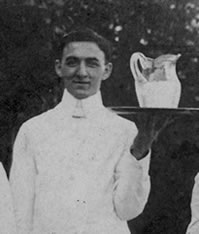“Richard Forrest’s life was characterized by his venturing out, in faith, and without funds, whenever he has felt the Lord’s definite leading. So it was going to Bible school.
“It happened that Richard had only carfare to Nyack, New York, where he felt that he had been called to get the Bible training he needed.
“He swung off the train, picked up his telescope, squared his shoulders, and started up the hill to the business office of the Missionary Training Institute, where he hoped to get some help finding a job.
“’Dear Lord, help me find a job. I’m willing to do anything,’ he prayed as he walked along.
“Within moments he was ushered into the presence of the business manager of the Institute, a lady, who asked what he wanted.
“’A job—anything so I can stay here and get some training.’
“’How much money do you have?’
“’None—but I’m not afraid to work.’
“’Why did you come?’ she demanded. ‘You know it costs money to operate a school, and the students have certain fees and other obligations that must be met. How do you figure on paying?’
“’I believe the Lord will supply my need and, as I said, I’m willing work.’
“’Young man,’ she replied, ‘I appreciate your desire for an education and your zeal. But the fact of the matter is that nearly all of the young people who want to come here are in circumstances similar to yours. They have no money. How can the Institute pay its bills?’
“’Isn’t there anyone here in Nyack who needs help? I’ll build fires, carry ashes, anything?’
“’I’m telling you, there is no work to be had. I’m sorry, but that’s the truth.’ With that, she turned back to her work.
“Richard turned dejectedly and walked slowly from the room. Now what would he do? He was sure God meant for him to be here. Could he be wrong?
“Aimlessly, he wandered into what was known as the South Parlor, a reception room in the same building. He walked over to a table in the center of the room and glanced down. Without realizing what he was doing, he began reading a newspaper lying on the table, left open at the want ad section. Suddenly he picked up the paper. One ‘Help Wanted’ ad had caught his attention. He reread it: ‘Wanted—girl to do general housework.’
“Girl? He could do anything around a house that a girl could do. He scanned the page, then looked back to the first ad. It was the only one for which he could at all qualify. Taking his knife out of his pocket, he cut out the notice, pocketed it, and walked quickly from the room.
“A few minutes later he was knocking at the door of the home of Miss Sarah A. Staley, a godly Episcopalian woman who was at that time principal of Greenpoint Public School of Greater New York.
“Miss Staley opened the door and looked at the gangling youth standing there. Now, what could this lad want? He looked most uncomfortable, but determined. Then she saw the advertisement in his hand. ‘Yes?’ she encouraged, trying not to smile.
“Richard could see the corners of her mouth twitching. He wanted to turn on his heels and run, but he had a determination born of desperation. Holding out the slip of paper, he said, ‘I came to answer this.’
“’Are you sure you read it correctly?’
“’I thought so.’ (If only it hadn’t so specifically said ‘girl’!)
“’The advertisement calls for a house girl, you know.’
“’Yes, ma’am, but I can do anything about a house that a girl can.’
“She started to say no—then hesitated. She inspected the boy, from the crown of his head to the soles of his shoes. She noticed his earnestness—the pleading in his eyes.

Then she smiled; and he knew he had the job. He breathed a prayer of thanksgiving.
“For two years, Richard Forrest worked for Miss Staley. He helped cook, made beds, cleaned, and did many other jobs that a girl couldn’t have done, such as mowing the lawn and riddling ashes. (Hard coal was burned, and all that dropped through to the ashes without burning was retrieved.) Another of his duties was taking Miss Staley to the train and bringing her back each day, since she commuted to New York City for her work.
“Miss Staley had one idiosyncrasy, which affect Richard personally. She could not stand to have a chipped dish in the house. Whenever a chip appeared in a plate, cup, or other dish, Miss Staley would seize the offending article and march out into the back yard. Then with all her force, she’d hurl the dish, smashing it against a stonewall.
“Richard soon learned that he was expected to pay for any dish that met this untimely doom, and he tried to be as careful as possible, for each penny was precious. His fingers were sometimes clumsy, though, and another cup or plate would sail through the air.
“Human nature can stand only so much punishment of a kind, however, before it strikes back. This time it was a plate, the chip hardly noticeable, but Miss Staley’s sharp eyes caught the defect. As she snatched the plate and started for the door, Richard called: ‘Wait, Miss Staley, I’m going to have to pay for that plate. Give me the satisfaction of smashing it.’
“Miss Staley never smashed another dish so long as Richard worked for her.†(Taken from Achieving the Impossible With God).

